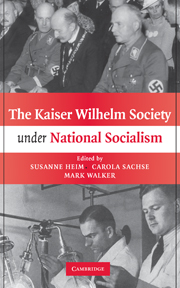Book contents
- Frontmatter
- Contents
- Tables
- Illustrations
- Editors
- Contributors
- Abbreviations
- Archives
- 1 The Kaiser Wilhelm Society under National Socialism
- SECTION I RESEARCH AND PERSONNEL POLICIES
- 2 A Success Story? Highlighting the History of the Kaiser Wilhelm Society's General Administration in the Third Reich
- 3 “No Time to Debate and Ask Questions” – Forced Labor for Science in the Kaiser Wilhelm Society, 1939–1945
- 4 Adolf Butenanbt between Science and Politics: From the Weimer Republic to the Federal Republic of Germany
- SECTION II RACIAL RESEARCH
- SECTION III EASTERN RESEARCH, LIVING SPACE, BREEDING RESEARCH
- SECTION IV MILITARY RESEARCH
- SECTION V THE POSTWAR “POLITICS OF THE PAST”
- Bibliography
- Index
2 - A Success Story? Highlighting the History of the Kaiser Wilhelm Society's General Administration in the Third Reich
Published online by Cambridge University Press: 29 July 2009
- Frontmatter
- Contents
- Tables
- Illustrations
- Editors
- Contributors
- Abbreviations
- Archives
- 1 The Kaiser Wilhelm Society under National Socialism
- SECTION I RESEARCH AND PERSONNEL POLICIES
- 2 A Success Story? Highlighting the History of the Kaiser Wilhelm Society's General Administration in the Third Reich
- 3 “No Time to Debate and Ask Questions” – Forced Labor for Science in the Kaiser Wilhelm Society, 1939–1945
- 4 Adolf Butenanbt between Science and Politics: From the Weimer Republic to the Federal Republic of Germany
- SECTION II RACIAL RESEARCH
- SECTION III EASTERN RESEARCH, LIVING SPACE, BREEDING RESEARCH
- SECTION IV MILITARY RESEARCH
- SECTION V THE POSTWAR “POLITICS OF THE PAST”
- Bibliography
- Index
Summary
The recollections and “retrospectives” occasioned by the respective anniversaries of the Max Planck Society (Max-planck-Gesellschaft, MPS) and Kaiser Wilhelm Society (Kaiser-Wilhelm-Gesellschaft, KWS) often give the impression that the years of the Third Reich had been an era of peril and courage for these organizations. For instance, in 1954 Otto Hahn, Nobel laureate and first president of the MPS, explained that only with the greatest of difficulties had it been possible “to maintain the Kaiser Wilhelm Society's independence, which at some point had been seriously at stake.”. Following the collapse of the Nazi regime, others, like Nobel laureates Richard Kuhn and Adolf Butenandt, darkly spoke of the “grave and manifold difficulties … during the increasingly deteriorating era of National Socialism” and “science treated as unworthy” with “disregard of its autonomy” during an era “we don't care to remember” and where “more than once everything had been at stake.”
A particularly impressive metaphor has been ascribed to Max Planck. According to Butenandt's interview with Kristie Macrakis in 1985, Planck described Nazi rule as “a thunder storm sweeping over us” that caused “some trees to come down.” Yet “there was no point” in “shouting at a thunderstorm,” he maintained. One had to wait until “the storm was over.” In reading those words, one almost sees those gentlemen opening their umbrellas, casting anxious glances to the sky to see if a branch was threatening to hit them on the head – huddled together, hoping that the bad weather would eventually move on.
- Type
- Chapter
- Information
- The Kaiser Wilhelm Society under National Socialism , pp. 19 - 46Publisher: Cambridge University PressPrint publication year: 2009

